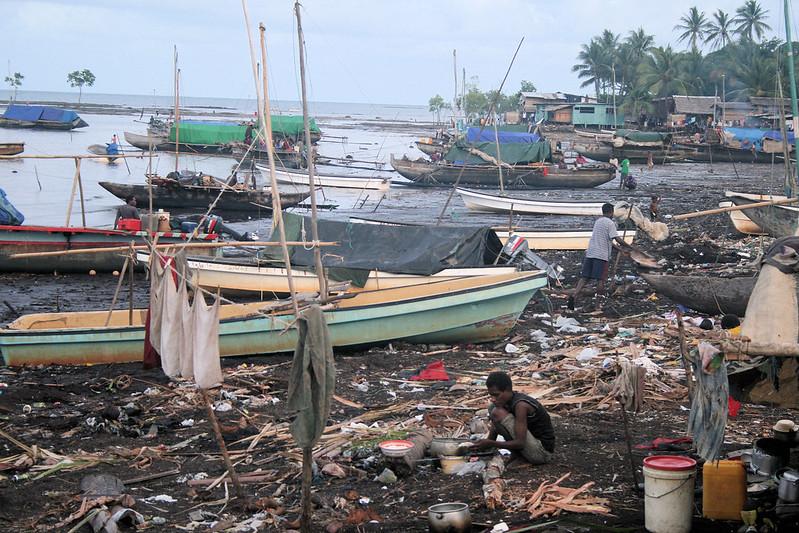Australia’s rescue package for PNG must tackle much deeper problems
Posted By Jeffrey Wall on April 7, 2020 @ 12:35

Australia will inevitably be called on to play a leading role in the economic and fiscal rescue package Papua New Guinea desperately needs.
The amount required to prevent PNG from becoming a failed state is eye-watering.
The original program discussed with the International Monetary Fund, and other countries and agencies, was believed to have been around US$1.7 billion. The latest estimate [1] is around US$2.2 billion.
The package is still being referred to as a ‘coronavirus rescue package’, which could create the wrong impression. The economic and social restrictions imposed in a bid to contain the spread of the virus in PNG are hitting a nation already in a dire economic and fiscal state [2].
PNG was in need of serious assistance—especially fiscal support and reform—long before the virus struck. If the package is viewed as just a response to the virus, much-needed structural reform will be neglected.
Australia has an opportunity here to help deal with PNG’s longer term economic problems.
PNG government debt, including debt held by state-owned enterprises, is more than A$13 billion [3]. That is the highest ever, and at the very edge of the debt safety figure currently in place.
So whatever package is decided on by the IMF, the World Bank and donor countries such as Australia will have a serious impact on the total state debt, and the PNG government’s ability to repay it.
Australia’s contribution has to keep this stark reality in mind.
Our current development assistance to PNG is around A$600 million. To that must be added the A$400 million loan we advanced late last year to support the budget for 2020. That will have to be rolled over and repayment deferred.
In general, our development assistance program in PNG is sound. It’s not perfect, but it has improved in recent years. As an example, the nonsensical policy of not funding directly programs run by the PNG churches has ended. The reality is that the churches in many communities in PNG aren’t just the best providers of rural health services, school education and vocational training, they’re the only providers.
Australia has always been careful about how it manages its relationship with PNG as the former colonial power and closest neighbour. But it’s 44 years since PNG became independent, and its people—and one would hope its national leaders—won’t object to an assistance package designed to deliver for the people and the economy.
Australia needs to toughen up its approach to corruption, and especially the abuse of public money, which remain inadequately addressed by Prime Minister James Marape’s government, despite encouraging assurances. No matter how strong the international package is, it will not fully deliver if the national and provincial governments don’t get a handle on corruption, fraud and gross misuse.
The inquiry into the UBS loan debacle [4] must continue, and, no matter how uncomfortable it might be for Australian companies and executives, the allegations that bribes were paid to ministers and officials in the mining and refugee detention sectors must be pursued and not ignored as is happening today.
The PNG parliament’s public accounts committee is doing an excellent job of exposing the rampant corruption and fraud in the health and hospitals sector that is denying the people basic lifesaving drugs and medicines. Australia could offer to provide qualified auditors and other officials from its own parliamentary committee system to help its under-resourced PNG counterpart prepare charges and a final report.
Australia should also insist that action be taken to address the evidence that the committee has received about the supply and distribution of vital medicines. This work used to be managed by Australia through AusAID. Surely, we can demand that it be reinstated?
PNG’s parliament has finally passed the legislation needed to establish an independent commission against corruption, so Australia could offer to properly resource it.
We should also look at increasing funding for the vital services the churches provide in PNG, an area in which China can’t compete.
There are many more matters on which Australia can reasonably ask that action be taken as a condition for what will be an expensive and wide-ranging package of economic and fiscal support.
The large PNG national and provincial bureaucracies will have to be substantially downsized. That will be painful for politicians who face a national election in just over two years. A transition program for public servants will be essential. Australia has the experience and capacity to work with the private sector, such as small business, farming, fishing and areas public servants can move into.
These are difficult times for Australia, so any assistance to PNG, even by way of loans, will have to be balanced carefully.
Whatever we contribute needs to help bring about change.
Article printed from The Strategist: https://aspistrategist.ru
URL to article: /australias-rescue-package-for-png-must-tackle-much-deeper-problems/
URLs in this post:
[1] estimate: https://www.afr.com/policy/foreign-affairs/png-staring-at-3b-bailout-from-australia-imf-world-bank-20200401-p54fyo
[2] dire economic and fiscal state: /png-already-faces-an-economic-fiscal-and-social-crisis-and-coronavirus-is-still-to-come/
[3] more than A$13 billion: https://www.thenational.com.pg/row-over-budget/
[4] UBS loan debacle: https://www.afr.com/policy/foreign-affairs/ubs-loan-to-png-government-may-have-breached-15-laws-20190515-p51nls
Click here to print.